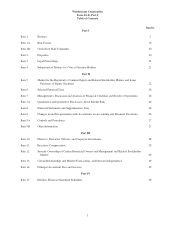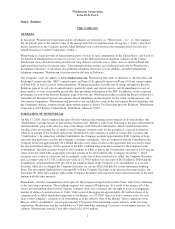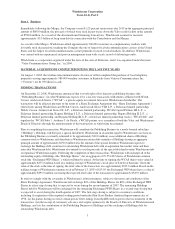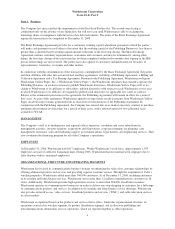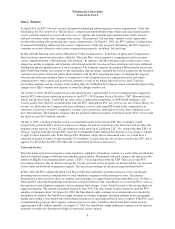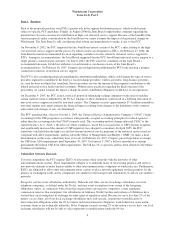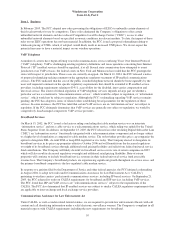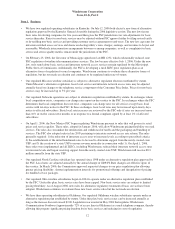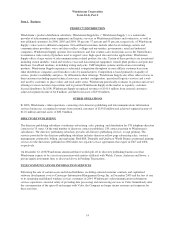Windstream 2006 Annual Report Download - page 74
Download and view the complete annual report
Please find page 74 of the 2006 Windstream annual report below. You can navigate through the pages in the report by either clicking on the pages listed below, or by using the keyword search tool below to find specific information within the annual report.
Windstream Corporation
Form 10-K, Part I
Item 1. Business
In February 2005, The FCC adopted new rules governing the obligations of ILECs to unbundle certain elements of
their local networks for use by competitors. These rules eliminated the Company’s obligation to offer certain
unbundled network elements and also reduced Competitive Local Exchange Carrier (“CLEC”) access to other
unbundled network elements based on specified economic conditions in relevant markets. To date, the impact of these
rules on our ILEC operations has not been material. In addition, the FCC issued a proposed rulemaking relating to
wholesale pricing of UNEs, which, if adopted, would likely result in increased UNE prices. We do not expect the
potential increases to have a material impact on our wireline operations.
VoIP Telephony
A number of carriers have begun offering voice telecommunications services utilizing Voice Over Internet Protocol
(“VoIP”) telephony. VoIP is challenging existing regulatory definitions and raises questions concerning how Internet
Protocol (“IP”) enabled services should be regulated, if at all. Several state commissions have attempted to assert
jurisdiction over VoIP services, but federal courts in New York and Minnesota have ruled that the FCC preempts the
states with respect to jurisdiction. These cases are currently on appeal. On March 10, 2004, the FCC released a notice
of proposed rulemaking seeking comment on the appropriate regulatory treatment of IP-enabled communications
services. The FCC indicated that the cost of the public switched telephone network should be borne equitably by the
users and requested comment on the specific regulatory requirements that should be extended to IP-enabled service
providers, including requirements relating to E-911, accessibility for the disabled, inter-carrier compensation and
universal service. The extent of federal regulation of VoIP telephony services depends in large part on whether a
particular service is considered a “telecommunications service”, which would be subject to regulation, or “information
service”, which would not be subject to regulation. Although the FCC’s rulemaking regarding VoIP services remains
pending, the FCC has adopted a series of related orders establishing broad parameters for the regulation of those
services. In some instances, the FCC has ruled that certain VoIP services are an “information service” not subject to
regulation. If the FCC ultimately determines that VoIP services are generally not subject to regulation, we would be
competitively disadvantaged compared to VoIP service providers.
Broadband Services
On March 15, 2002, the FCC issued a declaratory ruling concluding that cable modem service was an interstate
“information service” and not a cable service or a telecommunications service, which ruling was upheld by the United
States Supreme Court. In addition, on September 23, 2005, the FCC released an order declaring Digital Subscriber Line
(“DSL”) an “information service” functionally integrated with a telecommunications component and no longer subject
to a higher level of regulation as compared to cable modem service. The order further provides price cap companies the
option to deregulate DSL, de-tariff DSL or keep DSL regulated as it is today. The Company elected to deregulate its
broadband services in its price-cap properties effective October 2006 and will benefit from the decreased regulatory
oversight of its broadband services through additional retail pricing flexibility and relief from federal universal service
fund contributions. The Company will likely de-tariff its broadband services in its rate-of-return companies in 2007,
which will also result in decreased regulatory oversight and additional retail pricing flexibility. Rate-of-return
properties will continue to include broadband service revenues in their federal universal service fund assessable
revenue base. The Company’s broadband products are experiencing significant growth throughout its service areas, and
the primary broadband competitor is the less regulated cable modem service.
In response to a petition filed by the Department of Justice and other federal agencies, the FCC initiated a rulemaking
in August 2004, to adopt new rules under Communications Assistance for Law Enforcement Act (“CALEA”)
pertaining to wireline carriers’ packet mode communications services, including IP-based services. On September 21,
2005, the FCC released its order on CALEA requirements for broadband and ISP services, including VoIP services.
The FCC found that ISP and VoIP services are “telecommunications services” subject to the requirements of the
CALEA. The FCC also determined that IP-enabled services are subject to similar CALEA regulatory requirements that
are applicable to inter-exchange and local exchange service providers.
Communications Assistance for Law Enforcement Act
Under CALEA, as well as under related federal statutes, we are required to provide law enforcement officials with call
content and call identifying information under a valid electronic surveillance warrant. The Company is compliant in all
material respects with CALEA requirements including the new requirements for broadband.
10



